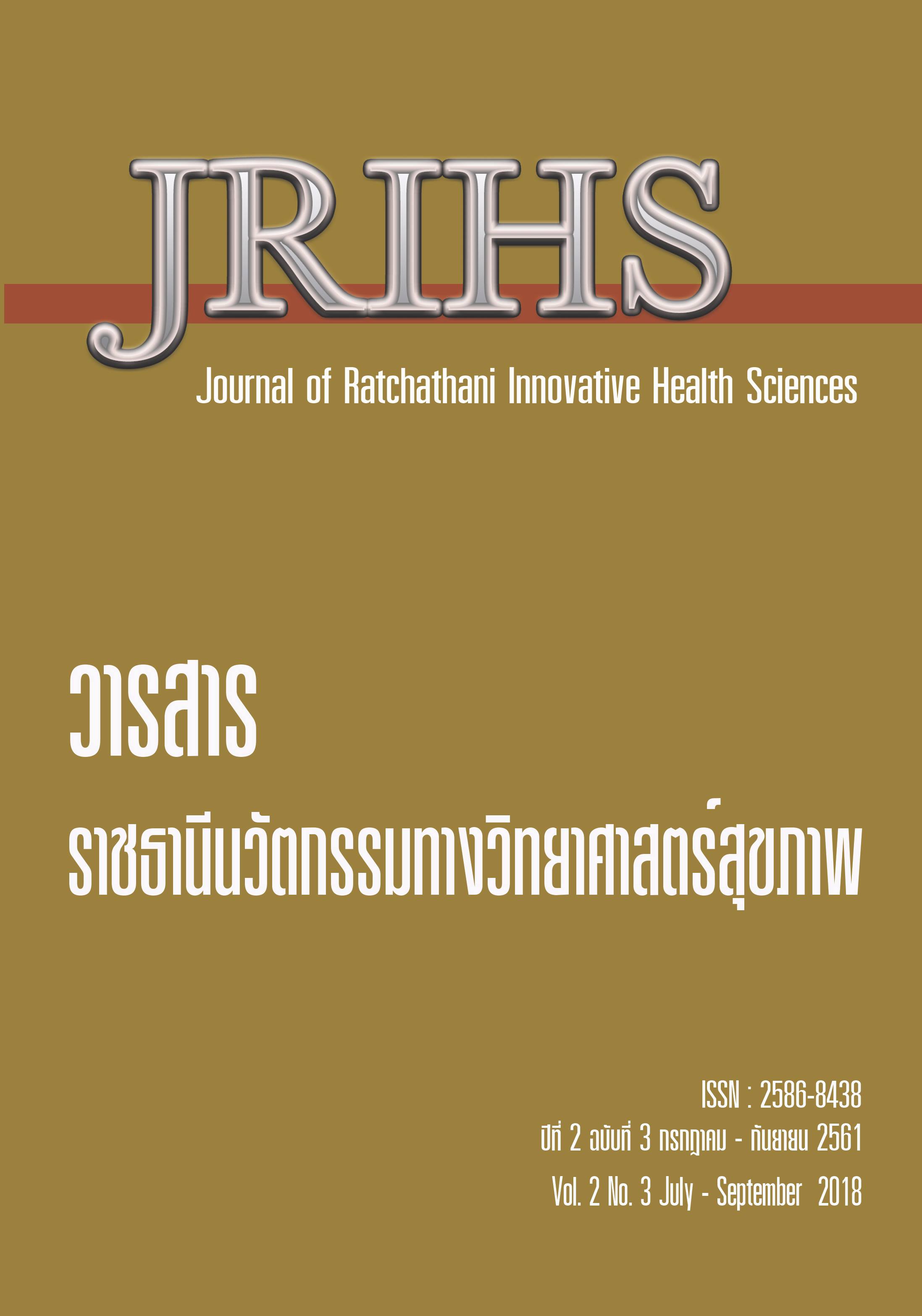Strengthening individual, family, and community abilities to promotehealth in Community Way and well-being of people with diabetes and hypertension in Thambon Talat-Khwan, Doi Saket District, Chiang Mai
Main Article Content
Abstract
Abstract This article aims to present the results of the study on Strengthening individual, family, and community abilities to promote health in Community Way and well-being of people with diabetes and hypertension Which has a supplementary process consisting of 3 important elements are patients, families and communities. Patients must receive 1) knowledge and beliefs 2) increase skills and ability to self-regulate and self-management 3) social assistance from Community to bring to change behavior to be able to manage themselves in terms of having meal exercise And dealing with emotions The family has a part to recognize the problems of patients together, planning for patient care. As well as promoting Supporting patients to be able to take care of their health appropriately with the disease. And the community is involved in integrating the way of life local knowledge And benefits in the community To encourage patients to be able to take care of themselves From the cooperation of the three parties, the results showed that 1) Increase health care behavior of knowledge, attitudes and behaviors of diabetic patients and hypertension patient 2) Individuals in the family with diabetes and hypertension is involved in caring for the patients. 3) A model community is established to take care of diabetics patient and hypertension patient in the community way
Keywords: , , Hypertension patient, Family, Community
Article Details
ความคิดเห็นและข้อเสนอแนะใดๆ ที่นำเสนอในบทความเป็นของผู้เขียนแต่เพียงผู้เดียว โดยบรรณาธิการ กองบรรณาธิการ และคณะกรรมการวารสารราชธานีนวัตกรรมทางวิทยาศาสตร์สุขภาพไม่ได้มีส่วนเกี่ยวข้องแต่อย่างใด มหาวิทยาลัยราชธานี บรรณาธิการ และกองบรรณาธิการจะไม่รับผิดชอบต่อข้อผิดพลาดหรือผลที่เกิดขึ้น จากการใช้ข้อมูลที่ปรากฏในวารสารฉบับนี้
References
นิรมล เมืองโสม. (2553). รายงานการวิจัย เรื่องการพัฒนารูปแบบการมีส่วนร่วมในการจัดการด้านสุขภาพเพื่อการส่งเสริมสุขภาพและการป้องกันโรคของกองทุนหลักประกันสุขภาพท้องถิ่น กรณีศึกษาตำบลดอนดู่ อำเภอหนองสองห้อง จังหวัดขอนแก่น.
วรชัย ทองคำฟู. (2551). วิถีชุมชนในการเรียนรู้รูปแบบเกษตรยั่งยืนตามแนวคิดเศรษฐกิจพอเพียงในชุมชนบ้านป่าไผ่ ตำบลแม่โป่ง อำเภอดอยสะเก็ด จังหวัดเชียงใหม่, รายงานการวิจัยฉบับสมบูรณ์.
เบญจมาศ ถาดแสง, ดวงฤดีลาศุขะ, และ ทศพร คำผลศิริ. (2555). ผลของโปรแกรมสนับสนุน การจัดการตนเองต่อพฤติกรรมการจัดการตนเองและค่าความดันโลหิต
ของผู้สูงอายุที่มี ความดันโลหิตสูง. พยาบาลสาร, 39(4), 124-137.
ระพีพร วาโยบุตร. (2556). การพัฒนาแนวทางการดูแลผู้ป่วยเบาหวานชนิดที่ 2 โดยการมีส่วนร่วมของครอบครัวและชุมชน หมู่บ้านหนองโดน อำเภอเมือง จังหวัดมหาสารคาม. วารสารกองการพยาบาล, 41(1).
สุพิณญา คงเจริญ. ชดช้อย วัฒนะ และธีรนุช ห้านิรัติศัย. (2556). ผลของโปรแกรมการกำกับตนเองเพื่อควบคุมความดันโลหิตต่อพฤติกรรมการกำกับตนเอง ระดับความดันโลหิตและภาวะเสี่ยงต่อการเกิดโรคหลอดเลือดสมองในชาวไทยมุสลิมที่เป็นโรคความดันโลหิตสูง. พยาบาลสาร, 40(1). 23-32.
Bandura, A. (1997). Self efficacy: The exercise of control. New York: Freeman.
Lorig, K. (1993). Self-management of chronic illness: A model for the future. Generations, XVI, 1(3), 11-14.
Lorig, K.R., & Holman, H. (2003). Self-management education: History, definition,
outcomes, and mechanism. The Society of Bhavioral Medicine, 26(1), 1-7.
World Health Organization (WHO). (2013). A global brief on hypertension Silent killer, global public health crisis. Retrieved from
http://www.who.int/cardiovascular_diseases/publications/global_brief_hypertension/en


